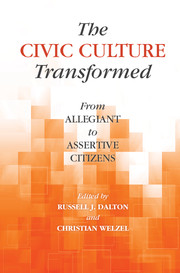Book contents
- Frontmatter
- Dedication
- Contents
- List of Figures
- List of Tables
- Contributors
- Foreword
- Preface and Acknowledgments
- 1 Political Culture and Value Change
- Part A Changing Values
- Part B Changing Images of Government
- 5 Reassessing the Civic Culture Model
- 6 Dissatisfied Democrats
- 7 Support for Democracy in Postcommunist Europe and Post-Soviet Eurasia
- Part C The Impact of Cultural Change
- References
- Index
7 - Support for Democracy in Postcommunist Europe and Post-Soviet Eurasia
Published online by Cambridge University Press: 05 January 2015
- Frontmatter
- Dedication
- Contents
- List of Figures
- List of Tables
- Contributors
- Foreword
- Preface and Acknowledgments
- 1 Political Culture and Value Change
- Part A Changing Values
- Part B Changing Images of Government
- 5 Reassessing the Civic Culture Model
- 6 Dissatisfied Democrats
- 7 Support for Democracy in Postcommunist Europe and Post-Soviet Eurasia
- Part C The Impact of Cultural Change
- References
- Index
Summary
The transformation of Central and Eastern European (CEE) political systems since the double “big bang” of November 1989 in communist Europe and December 1991 in the Soviet Union represents one of the most profound institutional changes in modern political history. This chapter analyses the political cultures in postcommunist Europe and post-Soviet Eurasia in roughly the two decades following these transitions. We compare countries along a continuum from authoritarian to democratic regimes in the years since the big bang. Resonating with the theme of this book, we demonstrate that the course toward democracy has been more successful where the political configuration approaches the features of an “assertive culture,” combining strong support for the principles of democracy with weak support for concrete political institutions. This pattern is more pronounced in the western portions of the postcommunist world and contrasts with an eastern pattern of largely failed attempts at democratization. The eastern nations often display a political culture in which the “allegiant” elements are more pronounced, especially where this tends to be counterproductive to democratic improvements: the concrete political institutions.
The postcommunist world’s eruptive transformation produced a massive and compact “fourth wave” of democratization (McFaul 2002). During the Cold War, the region was regarded as the Second World: the camp of one-party states with a dictatorial communist political system and a centrally planned economy. This Second World of communist nations took its final shape with the erection of the Iron Curtain in 1948. The First World of liberal democracies developed a culture that Western scholars described in such terms as “participant liberalism.” They also contrasted it with a culture of “authoritarian statism” in the Second World, which supposedly persisted for more than seventy years in the Soviet Union and for more than forty years in its satellite states in CEE.
- Type
- Chapter
- Information
- The Civic Culture TransformedFrom Allegiant to Assertive Citizens, pp. 158 - 190Publisher: Cambridge University PressPrint publication year: 2014
- 11
- Cited by



